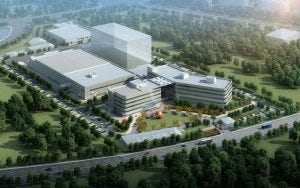Much of Asia lacks traditional biomanufacturing infrastructure according to GE Healthcare, which says prefabricated facilities like its KUBio platform can support the rapid biologics growth in the region.
BeiGene Ltd inked a deal with GE Healthcare in 2015 to install the bioprocessing vendor’s FlexFactory platform at its clinical monoclonal antibody facility in Suzhou, China.
Three years on and the Chinese biotech firm has chosen GE Healthcare’s prefabricated biomanufacturing facility offering KUBio for commercial production of cancer MAbs at a site in Guangzhou, set to be completed and operational in 2019.

Artist rendering of BeiGene’s facility in Guangzhou, China which utilizes GE Healthcare’s KUBio platform. Image:c/o GE Healthcare
The selection of GE’s off-the-shelf platform is the natural progression for BeiGene, said Olivier Loeillot, general manager of BioProcess at GE Healthcare Life Sciences. “With KUBio BeiGene is now able to establish late-stage clinical and commercial production capacity,” he told BioProcess Insider.
“GE Healthcare’s KUBio for monoclonal antibodies (mAbs) is a two-story building with a total floor space of 1,500 sq. m and can include up to four 2,000 liter single-use bioreactors,” he continued, though did not disclose the size & capacity of BeiGene’s KUBio.
Pop-up plants
Based on single-use technologies, GE claims KUBio can be constructed, assembled and fully fitted-out to current Good Manufacturing Practices (cGMP) standards in approximately 18 months, up to half the time of traditional builds.
BeiGene joins JHL Biotech and Pfizer as KUBio customers in China, where the firm sees a major market for prefabricated facilities.
“There are many Asian & Chinese and international biopharmaceutical companies that are now establishing biopharma manufacturing capacity in China,” Loeillot told us. “However, to establish biomanufacturing in a region with less infrastructure means building a facility in a greenfield environment, rather than in an existing laboratory or facility like in the US or Europe.”
Therefore, he added, these facilities need to be constructed faster and with future flexibility in mind and options like KUBio are a perfect fit.
While GE is operating and collaborating with biopharmaceutical companies globally, “the Chinese market is growing fast and therefore we are seeing many KUBio and FlexFactory installations in China,” he said.

schedl_b_and_w.jpg?width=100&auto=webp&quality=80&disable=upscale)


schedl_b_and_w.jpg?width=400&auto=webp&quality=80&disable=upscale)


